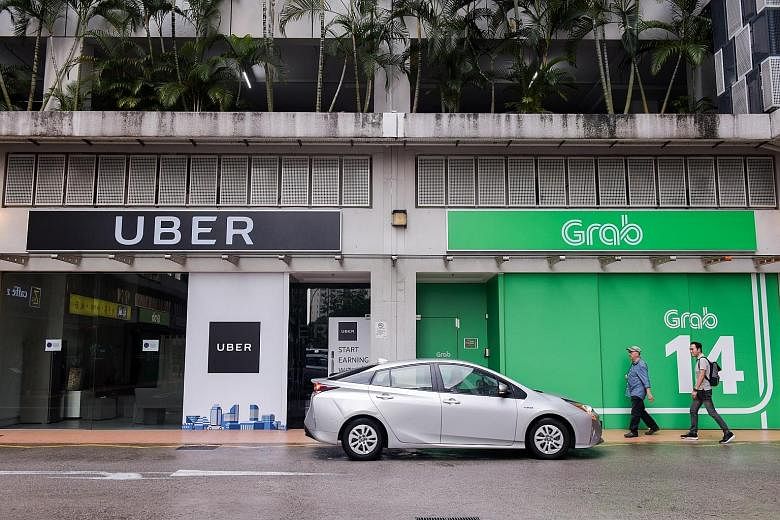The merger between Grab and rival Uber in March has made it difficult for new entrants to compete with the ride-hailing giant, said observers, and measures proposed by Singapore's competition watchdog yesterday are a right move to tackle it.
They also said that by requiring Grab to remove any exclusivity obligations imposed on drivers and maintain pre-merger pricing and commission rates, the ride-hailing market's contestability should hopefully be restored.
The experts were responding to yesterday's announcement by the Competition and Consumer Commission of Singapore (CCCS) that it had provisionally found that the Grab-Uber mergerinfringed the Competition Act.
Under the tie-up agreement, Uber sold its South-east Asian business, including Singapore's, to Grab in exchange for a 27.5 per cent stake in the latter company.
National University of Singapore's (NUS) law faculty Sheridan Fellow Kenneth Khoo said that in the ride-hailing business, a platform becomes more attractive to both users and drivers as their numbers increase because of efficiencies in matching both parties.
This means a new entrant like Ryde or Go-Jek starts off with a "major disadvantage" because it will have far fewer users, making it difficult to reach a big enough scale to challenge Grab.
"The problem is worsened if and when Grab imposes exclusivity obligations on its drivers so that they cannot easily switch over to a competing platform," he said. Removing these is thus an important measure, he added.
But NUS law faculty's Associate Professor Burton Ong said the CCCS' measures may have "limited effect" in restoring competition.
"Without details about how rigorously these measures will be implemented - for example, whether the CCCS will put an absolute prohibition on price increases and withdrawal of driver incentives - and how long they will be kept in place, it is hard to predict whether new entrants can effectively challenge Grab's dominance," he added.
Lawyer Kala Anandarajah, who heads Rajah & Tann's competition and antitrust and trade team, said that while the CCCS' measures will presumably bring back market competition, the fact remains that Uber has exited the sector.
Ms Anandarajah said the effects of the CCCS measures will not be seen overnight, but with existing technology and non-exclusive access to the platform, they could happen quite fast, she added.
Private-hire car driver S.K. Tan, 62, agrees with the CCCS' measures, saying drivers should be free to operate on any platform and not be punished with reduced incentives for doing so.
Mr Yap Shiwen, 32, who takes Grab at least twice a week, reckons that fares have risen between 10 per cent and 20 per cent since the Grab-Uber merger.
Mr Yap, a contributing editor for a tech blog, said the increase "may be a correction to market rates after a sustained price war with Uber".


